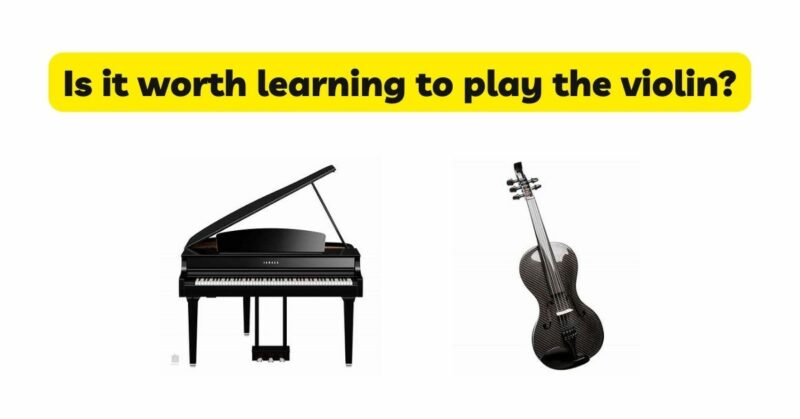Learning to play a musical instrument is a transformative and enriching experience, opening a world of artistic expression and personal growth. Among the myriad of instrument choices, the violin holds a special place, captivating both musicians and audiences with its enchanting sound and profound emotional impact. In this article, we will explore the worth and benefits of learning to play the violin. By examining the instrument’s expressive potential, cognitive and emotional benefits, the joy of performance, and the personal fulfillment it brings, we aim to shed light on the unique journey the violin offers and why it is indeed worth pursuing.
The Power of Expressive Potential:
The violin’s remarkable expressive potential lies at the core of its worth as an instrument to learn. The ability to draw a bow across the strings, producing a wide range of tonal colors, allows violinists to communicate emotions and stories through their music. The violin’s ability to emulate the human voice gives it a unique capacity to convey deep emotions and connect with listeners on a profound level. Whether playing classical masterpieces, folk tunes, or contemporary compositions, the violin has an unmatched ability to evoke a wide range of feelings, creating a powerful and lasting impact.
Cognitive and Emotional Benefits:
Learning to play the violin offers a wealth of cognitive and emotional benefits. The intricate fingerings, complex rhythms, and reading of musical notation provide mental stimulation, improving memory, concentration, and multitasking abilities. The constant interaction between the hands, the coordination required, and the attention to detail foster enhanced motor skills and dexterity. Moreover, the discipline and persistence demanded by the learning process instill valuable life skills, such as patience, perseverance, and self-discipline.
Playing the violin also serves as an outlet for emotional expression and self-reflection. The act of translating emotions into music allows for catharsis, stress relief, and the exploration of one’s inner world. The violin provides a means to express and process complex emotions, fostering emotional intelligence and self-awareness. This aspect of the instrument’s worth extends beyond technical proficiency, offering a profound connection between the player and the music.
The Joy of Performance:
One of the most rewarding aspects of learning the violin is the joy of performance. Whether playing for an audience or simply sharing music with friends and loved ones, the experience of performing is an opportunity to share one’s passion and connect with others. The violin’s expressive qualities and the emotional depth it conveys create a captivating and unforgettable experience for both the performer and the listener. The sense of accomplishment and the ability to touch people’s hearts through music make the journey of learning the violin truly worthwhile.
Personal Fulfillment and Growth:
Learning to play the violin is a journey of personal fulfillment and growth. As progress is made, self-confidence increases, and a sense of achievement is felt with each new piece mastered. The violin offers a continuous challenge, allowing for ongoing growth and development as a musician. Overcoming obstacles, refining technique, and exploring new musical horizons foster a sense of self-discovery and continuous improvement. The dedication required to learn the violin fosters a strong work ethic, resilience, and the ability to set and achieve goals, skills that extend beyond the realm of music and into all aspects of life.
Connecting with a Musical Community:
The violin opens doors to a vibrant and supportive musical community. Joining orchestras, chamber groups, or ensembles provides opportunities to collaborate with fellow musicians, share experiences, and learn from one another. The camaraderie and shared passion within the musical community create a sense of belonging and inspiration. Engaging in musical collaborations not only enhances musical skills but also cultivates valuable social connections and lifelong friendships.
Appreciation of Music:
Learning the violin deepens one’s appreciation for music as a whole. Through studying the violin, musicians gain a deeper understanding of music theory, harmony, and structure. This knowledge enriches the listening experience, allowing for a more profound appreciation of music in all its forms. Playing the violin also fosters an understanding of different musical styles and genres, broadening one’s musical horizons and nurturing a lifelong love and appreciation for the art of music.
Preservation of Cultural Heritage:
The violin holds a significant place in the preservation of cultural heritage. As one of the most prominent instruments in classical and folk music traditions, the violin allows musicians to connect with centuries-old musical legacies. By learning the violin, musicians become part of a lineage that stretches back through history, contributing to the preservation and continuation of musical traditions. The instrument’s worth extends beyond personal fulfillment, serving as a vessel for cultural expression and ensuring the vitality of musical heritage.
Conclusion:
The worth of learning to play the violin extends far beyond the mere acquisition of technical skills. Its expressive potential, cognitive and emotional benefits, joy of performance, personal growth, and the sense of belonging to a musical community all contribute to the instrument’s immense value. Learning the violin is an enriching and transformative journey that fosters self-expression, cultivates discipline and perseverance, and enhances appreciation for music as an art form. The violin’s unique ability to evoke emotions and touch people’s hearts makes it a truly worthwhile instrument to pursue. By embarking on the journey of learning the violin, individuals open themselves to a world of artistic fulfillment, personal growth, and the profound joy of sharing music with others.


